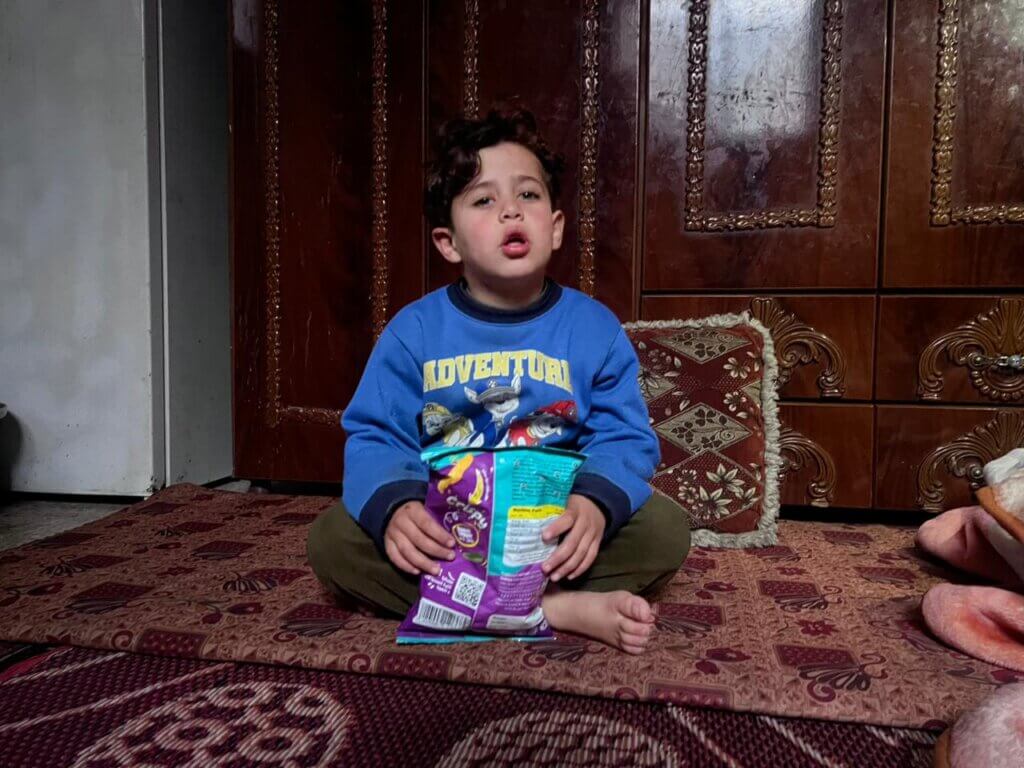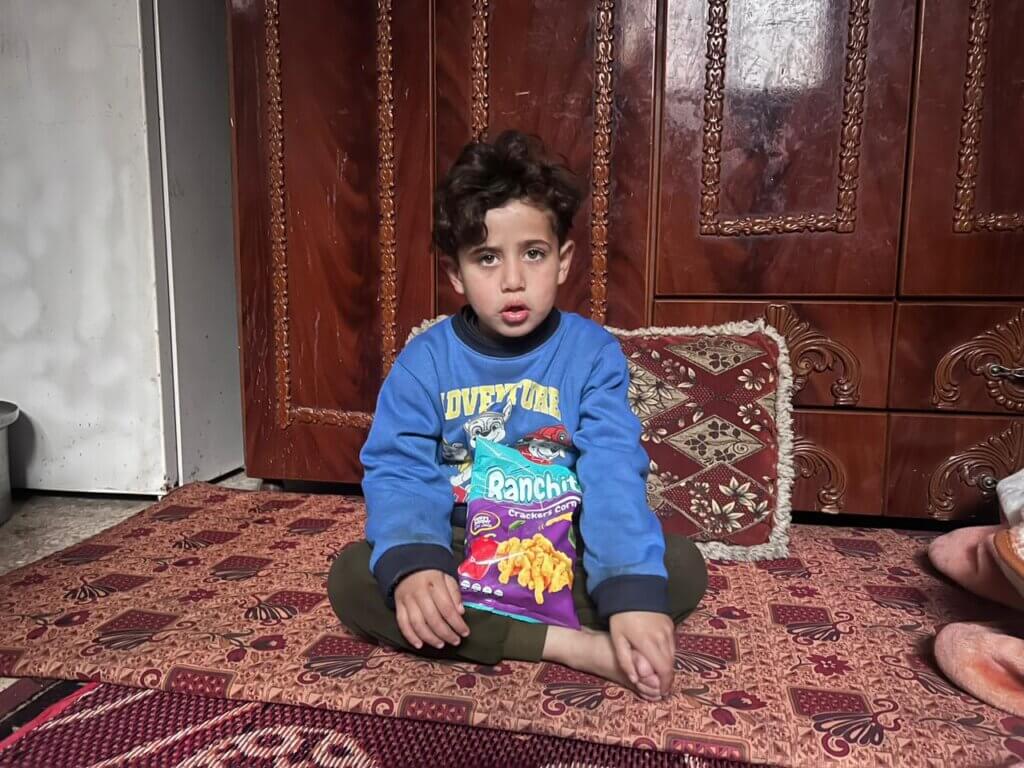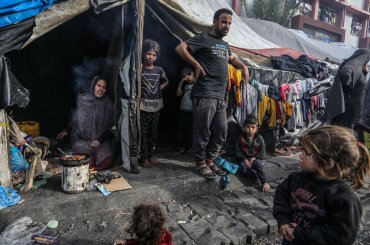The last thing five-year-old Arkan remembers is seeing his mother.
Her mother had been sprawled on the ground, bleeding from her leg and her mouth as she uttered, “got to Yousef,” perhaps knowing that these might be her final moments, commanding him to run to the house where there were people who would make sure he was safe.
This took place in Khan Younis’s al-Amal neighborhood — Arabic for “hope.” After seeing what he has, young Arkan has been left with none.
Arkan’s mother, Ulfat Shaqqura, 38, was displaced alongside her family from Khan Younis to Rafah when the bombardment in their neighborhood intensified. When she reached Rafah, she found out that her parents were stranded in al-Amal and were surrounded by Israeli forces, unable to move or evacuate. That was when Ulfat decided to go back, against the pleading of her family, to help her mother and father.
Ulfat took her son Arkan with her. Her husband, Abdallah Shaqqura, 39, says that when she reached the neighborhood, armed Israeli quadcopter drones opened fire on her directly, causing her to collapse. She continued to bleed out in the street for over three hours.
The boy Arkan escaped certain death. His mother’s last words to him were to tell him to run.
Arkan ran towards the house his mother told him about — Yousef’s house — and when he reached it, he told everyone that his mother had collapsed and that she was bleeding from the leg and mouth. But none of the people dared leave the building, knowing that anyone who ventured out into the open would be shot down immediately by the low-flying quadcopters.
Yousef’s family attempted to check on what happened to Arkan’s mother from within the house but could not spot her. After three hours, they were able to get close enough to identify Ulfat from afar, motionless and bleeding. Unable to ascertain whether she was still alive, they were forced to leave the area or risk sharing in Ulfat’s fate.
Yousef’s family looked after Arkan until the following day, when they were also displaced from Khan Younis and made their way to Rafah, taking Arkan with them. That was when they found his father Abdallah and broke the news to him, telling him that his wife had likely been killed and that his 76-year-old father, who also stayed behind in Khan Younis, was also killed.
Abdallah had no idea where they had gone — his wife had told him before leaving that she was going to find a dentist in the Kuwaiti Hospital in Rafah. That entire day, Abdallah was frantic, going from one place to another and visiting his displaced relatives in Rafah, asking where his wife had gone. He never expected that she would take such a risk and go back to Khan Younis.
“When I saw my son with them, I knew something horrific had happened to him,” Abdallah told Mondoweiss. “Because the look on his face had changed, and his eyes were filled with a fear I had never seen in him before, not even when he heard the warplanes and the bombs.”
“I fell to the ground and took my son in my arms and held him for ten minutes,” Abdallah continued. “I didn’t let go the entire time. I was crying, and he was crying, and we both felt the same pain.”
It was apparent to Abdallah that what his son had seen changed his life forever. “It was the first time that I held my child and was sure that he was experiencing an even greater pain than my own,” he said.
Before Yousef’s family left Khan Younis for Rafah, Arkan asked where his mother had gone and why she wasn’t coming with them. They told him that she was injured and taken to the hospital for treatment. They didn’t tell him that her fate was left uncertain and that she most likely bled out.
As of the time of writing, Abdallah has not told his son the truth, telling him that she is in the hospital but that they can’t go see her due to the fighting. But Abdallah says that Arkan doesn’t stop asking about his mother and keeps requesting to speak to her over the phone.
Forever changed
Abdallah has noticed new behaviors in Arkan that he has never seen before in his son.
“Arkan is such a lively kid. He always wants to play with people,” Abdallah says. “But after what happened, he’s always quiet, and he prefers isolating himself from loud noises or other children. And he keeps asking me in a hushed voice, ‘when will we go to see mama?’”
Abdallah says that Arkan no longer sleeps easily, screaming in the middle of the night and calling for his mother without waking up or knowing what he is doing. His father and aunts try to comfort him when this happens, each in their own way, making sure not to let the truth slip about Ulfat. Arkan has also started turning down food, and his father says that he’s been experiencing nighttime hallucinations and started wetting the bed at night, which he never did before.
“Arkan is such a wonderful child, and he was so full of energy,” Abdallah continued. “But everything’s changed for him now. He’s cold, and I see something new in his eyes. He is filled with pain and has no way of expressing it.”
“He also speaks differently now. He speaks quickly, and his words get jumbled, and you can tell he’s shaking a little bit,” he adds, saying that a “tremble of fear” seems to have taken control of his son’s speech.
When speaking with Arkan, everything Abdallah said becomes immediately apparent. I approached him in the Rafah home and had a relatively short conversation with him given his age, asking three simple questions. His answer to each reflected the same story; he would start with two words, and then abruptly shift to repeating the same sentence: “And my mom was on the ground. Blood was coming from her knee and her mouth. She said, ‘go to Yousef, run.’”
Any question leads back to that same answer, repeating the scene with his mother.

His father spends most of the day sitting outside by the main street of Rafah City near Yibna refugee camp, the same street that sees tens of thousands of refugees streaming through every day. He says he sits there outside the door of the house so he can find someone arriving from Khan Younis who might have news regarding his wife. Abdallah has since been led to believe that his wife might have been taken by someone to a nearby hospital. The closest hospital to that area is Nasser Hospital, which, as of now, is under siege and has experienced intense fighting and constant bombardment in the area.
Abdallah tried in the first few days after his son arrived to call any doctor, hospital worker, or refugee he knew at Nasser. Two days later, he received a phone call claiming that a woman by the name of Ulfat Shaqqura arrived at Nasser Hospital and was pronounced dead on arrival. But several hours after receiving the news, he got another phone call saying it was a case of mistaken identity, and that the woman who arrived bearing his wife’s name was an elderly woman who did not match the description of his wife.
Abdallah continues to wait outside the house and field phone calls, each of them giving him maddeningly inconsistent and contradictory news. One person informs him that she is being treated at Nasser and that she only has a minor injury to the stomach and will survive it. Another person says that no person by his wife’s name arrived at the hospital. Yet another tells him she died and was left on the side of the road. So far, Abdallah cannot know for certain what befell Ulfat. The location where she was shot continues to be the site of heavy fighting, and Israeli soldiers and quadcopters shoot anything that moves there.
Abdallah is not the only one who cannot venture to Khan Younis to discover the fate of his loved one — all the former residents of Khan Younis in Rafah have lost contact with their relatives. Abdallah says that he feels as if time has been frozen still since he heard about what happened.
Five days after his wife went missing, Abdallah began to come to terms with the fact that she was likely dead.
“I haven’t been able to get a single word about her, and if she were still alive, she would have found a way to reach out to us and put us at ease,” he says. “I keep telling my three children that she’s alive, that she’s being treated, but I’ve started to lose my faith in what I’m saying.”
“My wife went to help her besieged mother and father, who were cut off from water and food,” he continues. “She went to save their lives, and she lost her own. But she had no other choice.”
That choice cost Arkan his mother, possibly forever. Everything has changed for him now and for all the other children in Gaza who have lost a parent to Israel’s genocide. In November 2023, Mondoweiss reported on the story of Ayah Sha’ban, who lost her entire family of 14 people in an Israeli airstrike and was not told about what happened to them. These stories number in the thousands now, and as the war rages on, many more Ayahs and Arkans will suffer the same fate.



Terribly sad. To paraphrase a common observation: 25,000 is a statistic, the story of one child’s loss is a tragedy. I wonder if the drone availed of parts or technology suppled by the United States.